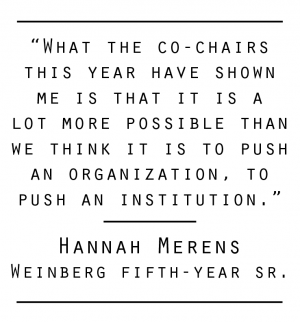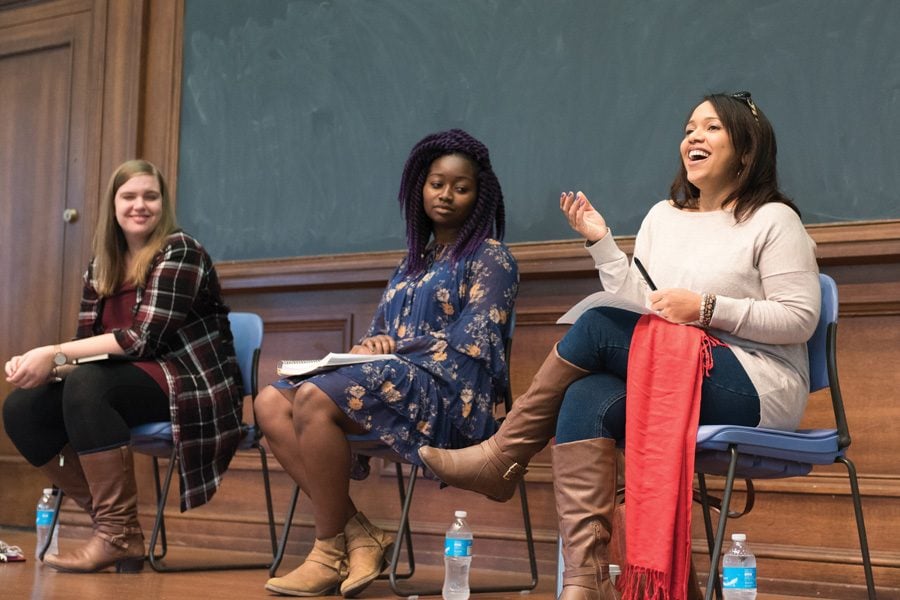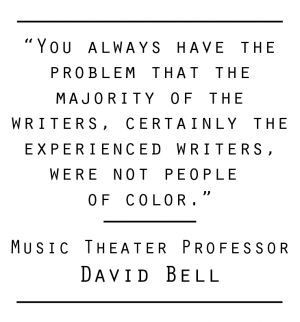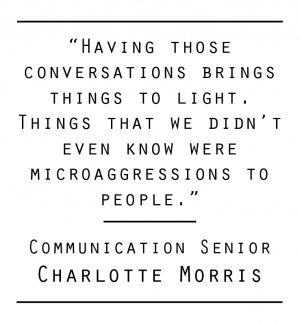In Focus: A New Waa-Mu
Waa-Mu, a Northwestern musical tradition, confronts calls for diversity
Lauren Duquette/Daily Senior Staffer
Adhana Reid (center) and theater prof. Melissa Foster (right) speak during a panel on diversity and inclusion in the Waa-Mu show at Harris Hall last month. The panelists said theater productions on campus should cast actors of color in non-stereotypical roles and represent the American population more accurately.
November 21, 2016
During “Gold,” the 84th Waa-Mu Show, Communication senior Adhana Reid found herself on stage, singing a song she never felt comfortable with.
“There were a number of microaggressive things that happened during that show’s process,” Reid said during a panel last month. “One of the things being the song that I sang with the other singular black character in the show. When we got on stage together, we sang a gospel song, but it didn’t make sense to me because the whole rest of the show was contemporary musical theater.”
The song, “Greater than the Games,” featured Reid and her fellow black castmate singing about track runner Jesse Owens as they observe his historic win during the 1936 Summer Olympics in Berlin. Behind them, a crowd of mostly white performers quietly observed their duet, chiming in with the chorus.
Before the show premiered, Reid brought her concerns to the show’s co-chairs, but it was too late. The show was close to opening day, and although Reid said she felt her concerns were heard, the number remained as written.
“I know for a fact that people raised their voices and said they had an issue with it. Black female writers in the room, and their voices were also squandered,” Reid said. “They said they had a problem. People said that they cared, and they didn’t do anything to change it.”
The Waa-Mu Show, which is written and performed entirely by students under the direction of music theater Prof. David Bell, has been called the “greatest college show in America” by the Associated Press and has been a part of Northwestern’s theater history for 87 years. For four quarters, students write and rehearse original songs and dialogue that will ultimately make it to the show, once approved by Bell. All in all, it takes about 200 students to put on the musical.
Bell, who had the final say on the gospel song, told The Daily he only found out about Reid’s complaints after opening night. After hearing criticism about the number, Bell said he acknowledged the concerns and apologized.
“You always have the problem that the majority of the writers, certainly the experienced writers, were not people of color,” he said. “We were actually writing shows that are specifically targeted for an African American, in this case, character, that were written by senior, non-African-American writers.”
Reid’s complaint is one of several Waa-Mu leaders have faced in the last few years as the show attempts to become more inclusive.
Students who criticized the show’s inclusivity pointed to casting practices, representation in the writers’ room and the historical whiteness of NU’s theater program. This year’s Waa-Mu co-chairs told The Daily they are making a concerted effort to create a show that more accurately represents the student body.
But in about five months, they also need to put on a full-scale musical.
A story from the Oregon Trail
Lorenzo Gudino couldn’t bring himself to go to 2016’s Waa-Mu Show, “Another Way West.”
In telling a story about the historical colonization of the West, an early draft of the musical failed to mention the mass killing of thousands of Native Americans, said Gudino, a member of the Fort Sill Apache Tribe. The Medill senior and his peers at NU’s Native American and Indigenous Student Alliance decided they could not let such a historical omission go.
Gudino said they told the show’s writers that telling the story of a white, Irish family on the trail without referencing the forced migration and mass killing of Native Americans was “distasteful.” In fall of 2015, NAISA asked Waa-Mu to rethink their approach to recounting the history of the Oregon Trail.
“It helps to have someone who is Native, someone who is really engaged in Native culture and history and identity from the get-go,” Gudino said. “Like, on staff, have someone who says, ‘Guys, that’s not the correct way to do that.’”
It was Kori Alston, a Communication junior and roommate of a Waa-Mu head writer, who alerted NAISA about the show’s theme after finding out that the script failed to mention this critical aspect of the history.
“When I heard that they were setting it on the Oregon Trail, my first question was, ‘Oh, how many Native American actors are you planning on putting up there?’ And the answer was obviously none,” said Alston, who identifies as multiracial: black, white and Native American.
Appalled by the idea of a show that “glorified” the Oregon Trail without acknowledging the violence that happened during the westward expansion, Alston said he posted on Waa-Mu’s Facebook profile, saying he “couldn’t wait” to see the ways in which the show addressed this mass killing. That was his first interaction with the group.
Though Waa-Mu leaders responded to him with an invite to join the writing team, he said no. To him, the transgression was already made.
Members of NAISA then wrote a letter to Bell and the co-chairs, asking the program to include a comment by NAISA on the importance of remembering the impact the Oregon Trail had on Native Americans.
The comment didn’t make it in. The program did include a note from a One Book One Northwestern faculty chair about the historical mass killing behind the trail. That year’s One Book selection was “The Inconvenient Indian,” which discusses Native American history in the U.S.
In response to a question about the program, Bell said Waa-Mu realized its obligation to address the mass killing even though it wasn’t the “principal thrust of our story.”
Additionally, Waa-Mu added a character who would occasionally appear to talk about the issue during the show. However, some students who raised the concern did not believe that these two measures were enough.
Hannah Merens, a contributing writer to Waa-Mu, said the inclusion of the character, an anthropology student specializing in indigenous studies, was a much-needed intervention in the show because he reminded the audience of the historical nuances that went unmentioned in the rest of the production.
But Merens, who wrote the character in, said getting a script approved that honestly confronted the issue of mass killing on stage was a challenge. Ultimately, during the editing process, head writers and co-chairs replaced the character’s dialogue on the history of the violence with other cultural notes instead, such as indigenous medicinal practices.
“If you’re not one of the head writers or someone who has been writing Waa-Mu for a couple of years, you do not really get a voice,” the Weinberg fifth-year senior said.
Bell said he wishes he and the Waa-Mu leaders had done more research to understand the different perspectives a story set on the Oregon Trail could have before they settled on that topic.
However, when complaints were brought to his attention, he said the show was already too far into production. He said he was reluctant to start the show over in mid-November, when the complaints were brought to him.
“By then there’s so much that goes in before you pick up the pencil, so much is planning the plot and talking about the story,” he said. “I would hate to be the person who pulls the trigger on a cancelling of a Waa-Mu Show, even for these really good reasons.”
Creating a cast
After deciding he wasn’t going to “sit by” on issues of inclusivity in the show this year, Alston set out to make sure the 86th Waa-Mu production tried harder.
Alston said his biggest issue is with the show’s casting procedures. Alston told Bell and the co-chairs they should begin making the show more inclusive by having a more diverse “Waa-2” group, a Waa-Mu subsection that comprises first-year students who promote the show in the NU community, especially among freshmen.
“It felt like only a certain amount of people knew about it,” said Communication junior Chamaya Moody, an outreach director for Waa-Mu. “It felt like it wasn’t intended to reach a large audience, like it was targeted to a specific group, and that’s why it was damaging for marginalized communities on campus, especially people of color.”
Moody said the group, which has been around for years, was mostly white last year.
To change this, the four co-chairs — Communication seniors Eric Peters, Charlotte Morris, Justin Tepper and Jessie Jennison — decided to do two rounds of auditions for this year’s group instead of one.
“Since we are trying so hard to make Waa-Mu more inclusive and representative of the voices that we have on campus, Waa-2 is the place to start that,” Morris said.
But casting is only one piece of the problem, Alston said. Efforts from students to make Waa-Mu more inclusive can be difficult when all final decisions are made by one person: Bell.
For Alston, the show’s checks and balances system is “kind of messed up.”
At the end of the day, Bell said he has the final say on the show since he is the director.
Alston believes the show should have a casting director, someone like theater Prof. Melissa Foster, the show’s vocal coach and a friend of Bell’s. In an interview with The Daily, Foster said she has already taken the unofficial role of diversity mentor for the show.
“She knows the voices of the students better than anyone else,” Alston said. “(She has) passion and commitment toward proper representation. She has the experience.”
NU’s major theater productions under the Virginia Wadsworth Wirtz Center for the Performing Arts are cast by general auditions, giving students a chance to audition for multiple shows at the same time.
Hiring a casting director, however, could get pricey.
“The University doesn’t use a casting director — the director casts,” Bell said. “I use a casting director whenever I cast in New York. It is a very expensive proposition.”
For his part in helping increase the show’s diversity, Bell said he’s encouraging more people to audition during generals, thereby increasing representation.
Waa-Mu co-chairs don’t have a say in the casting of their show. For Alston, this gives Bell too much power within NU’s musical theater community.
During the panel on inclusivity in the show, students took issue with comments made by Bell during the production process, from sexist remarks to impressions of people with disabilities.
“I fully don’t intend to be insensitive, but I’m sure that in an unguarded moment, who knows what I might have said,” Bell said. “I fully hate the thought that I’ve caused discomfort to other people.”
Bell, 67, said although there is a generational divide between him and Northwestern students, he tries to be sensitive to how language affects people.
Merens said Bell sometimes makes jokes when he doesn’t understand things but learns when someone intervenes.
“He’s made a comment about pronouns, but once the co-chairs spoke on my behalf, he didn’t anymore,” said Merens — who uses they, them, their pronouns.
However, Alston said a lot of this behavior is excused because of the control Bell has over NU’s musical theater program. In the larger theater community, Alston said, Bell can serve as the “gateway” to many shows and programs.
Bell said NU auditions are representative of standard casting procedure. Student actors, he said, learn how to navigate the real world of acting this way.
“Casting is a lot about the personal taste of the director,” he said. “That’s actually what the director does: apply their personal taste or aesthetic to the story.”
In the writers’ room
There is no official diversity chair within the Waa-Mu organization. Morris, a co-chair, said the group did not want to make a single person responsible for issues of inclusivity.
With Foster’s mentorship, she said, the group of Waa-Mu leaders is actively trying to make a change in the organization. Though he remains hopeful, Tepper, one of the co-chairs, said trying to take major steps toward inclusivity while creating an entire show can be taxing.
“It all comes back to that challenge that is now in our minds … We also have to write a show,” Tepper said. “However successful we are, who knows. All I think that we can say is we are really trying.”
With the help of Foster, Merens and Alston, the co-chairs have already implemented measures to keep conversation about inclusion in Waa-Mu present through all stages of the show’s production.
This quarter, the co-chairs, Foster and a group of students began meeting every few weeks with Bell to discuss the show’s progress. Merens said within days of the panel conversation earlier this quarter, Waa-Mu leaders put up a Multicultural Student Affairs workshop to discuss diversity in the show. They said the student outreach committee is also scheduling trainings and lectures on inclusion for students in the Waa-Mu writing class every other week next quarter.
“What the co-chairs this year have shown me is that it is a lot more possible than we think it is to push an organization, to push an institution,” Merens said.
Moody said the show’s executive board is planning on establishing an anonymous feedback system after every writers’ meeting and rehearsal.
“My biggest regret would be having someone harboring something and not being comfortable speaking out about it,” Moody said.
At the same panel where Reid spoke about her experience in “Gold,” Foster said she was excited to see the organization finally making strides toward inclusivity, though she said she was aware that the change won’t happen overnight.
In an interview with The Daily, Foster said this year’s production could lay the groundwork for a more diverse Waa-Mu Show in future years.
“A lot needs to be done,” she said. “Talking about diversity and inclusion in theater in general, everyone is trying, and a lot needs to happen.”
Foster said this year’s theme gave her hope for what could be the most inclusive Waa-Mu production in the show’s 87-year history.
The future of Waa-Mu
Though the writing hasn’t fully started yet, this year’s Waa-Mu leaders already have a vision for the 86th Waa-Mu Show, “Beyond Belief: A Superhero Story,” which opens on April 28.
“It’s a made-up story, so it doesn’t have to be historically accurate like past years,” Foster said. “That really opens up the field for inclusion and diversity and also dimensional and fleshed out characters that can sort of organically come to be by people discussing experiences.”
Jennison said the show will center around a fantasy world of superheroes. Though nothing is confirmed, no one, she said, is in the mindset that the characters must be of a certain identity.
Although Alston said he is glad to hear this year’s story won’t have limiting historical precedents since it’s set in a universe controlled by magical realism, the show runs the risk of moving the opposite direction — toward a post-racial world where identity is not addressed.
In order to avoid that, he said, the show’s writers must incorporate voices with a diverse set of experiences they want to see represented on stage. The co-chairs, executive board members and writers should not shy away from addressing race, Alston said.
“Asking actors to deny their experience is irresponsible,” he said.
One change will be to the show’s song “To The Memories,” which has traditionally been sung at Waa-Mu performances since 1951.
When Merens first heard the number, they felt uncomfortable. The original version of the song included a section in which only men serenade women. Merens, a member of Waa-Mu’s creative team and student outreach committee, thought Waa-Mu should make the song less heteronormative.
After bringing up the complaint to the co-chairs of “Gold” and then to the co-chairs of “Another Way West,” Merens said this year’s co-chairs decided to tweak the song. Waa-Mu changed the word “girls” to “friends” in one of the lines, which everyone now sings together.
To Jennison, this quick turnaround showed that students should not be afraid to speak up in order to make change.
“Having those conversations brings things to light. Things that we didn’t even know were microaggressions to people,” she said. “The coolest thing about these discussions is that they have been very honest. People have been very upfront about feelings that have been hurt.”
Bell said he hopes by giving students more spaces to express concerns this year, Waa-Mu will have more leaders of marginalized identities and tell their stories more “legitimately.”
“We want to … (make) sure that people of color enter this process when they’re freshmen and sophomores so by the time they’re seniors they can take a bigger ownership role of all of it,” he said.
Bell apologized for both Reid’s experience in “Gold” and the shortcomings in the plot of “Another Way West,” saying it is his responsibility as the faculty member in charge of the conversation to be aware of what could make students uncomfortable.
“It’s not like other people are responsible,” he said. “Ultimately the buck stops with me.”
This story has been updated to clarify that Waa-Mu is entirely student performed and written but is not exclusively student produced.
Email: [email protected]
Twitter: @marianaa_alfaro




